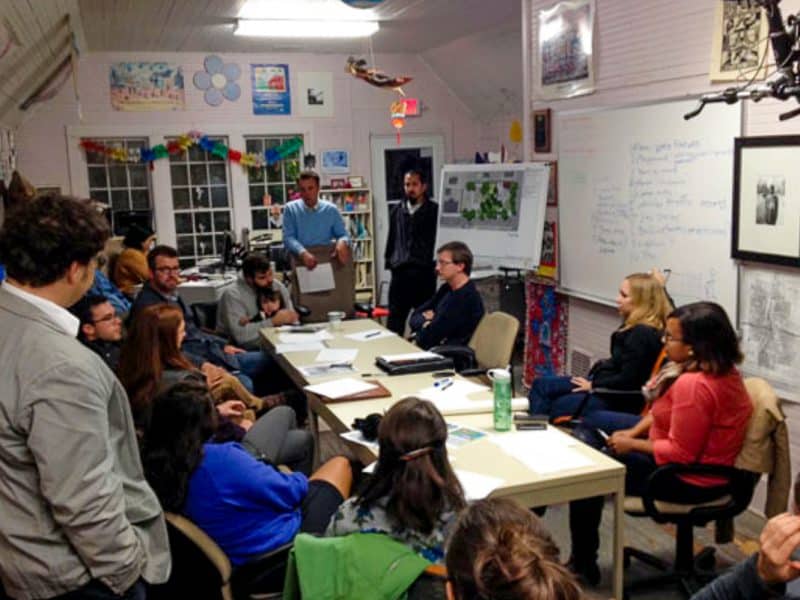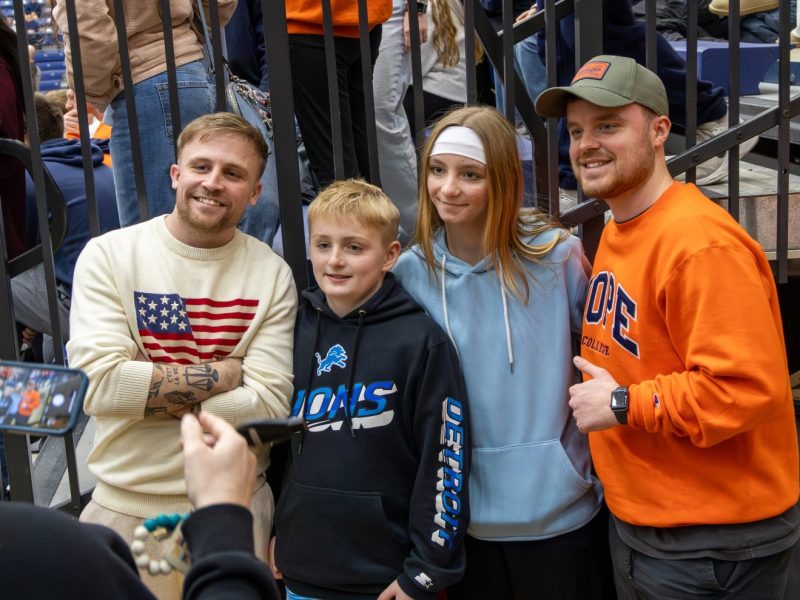A line in the sand: How Voters Not Politicians aims to end gerrymandering in Michigan
Empowering 3,500 volunteers to collect over 425,000 signatures in all 83 counties of Michigan, Voters Not Politicians, a group formed by Aquinas alumna Katie Fahey, aims to end gerrymandering in Michigan this November.
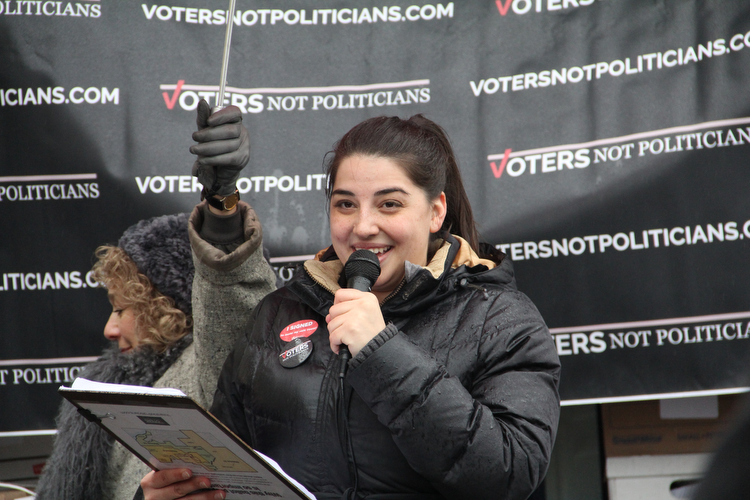
West Michigan was proud when, in late January, Caledonia resident Katie Fahey was featured in the New York Times, in a video, “My Fight to End Gerrymandering.” But this wasn’t the first time Fahey and her grassroots, non partisan ballot committee Voters Not Politicians (VNP) made headlines.
Last year, the Aquinas College alumna, along with a board of directors and thousands of volunteers, gathered more than 425,000 signatures in less than four months to put a constitutional amendment on the ballot this November. VNP surpassed the 315,654 signatures required and submitted them to the state in December 2017. The group hopes that Michigan voters will have the chance to decide to completely restructure the redistricting process in our state and end gerrymandering.
Like many momentous movements, VNP started small. It began with a Thanksgiving dinner—or more precisely, Fahey’s trepidation over visiting with her family after the divisive 2016 election. Her family had always had strong political views, and she anticipated they would only be stronger after the election.
Fahey, 28, realized that the conversations going on around the table seemed to just take different sides on core issues.
“Everyone had got so passionate, but it seemed everyone was saying the same thing from different angles,” she says.
Fahey also took note that two anti-establishment candidates, Bernie Sanders and Donald Trump, had won won the primary and general election in Michigan. “If this was the case, maybe the system is broken,” she says. “I began to wonder if we could come together and discuss how to fix our democracy.”
Digging into gerrymandering
Fahey sensed that voters had lost faith in the political system, and she instinctively went back to her knowledge of gerrymandering from high school. As she researched further, she began to understand why citizens felt so disconnected. “Right now, we have politicians carving our state out like a turkey,” she says.
According to VNP’s page, “Gerrymandering in Michigan,” federal law has three rules in place to control how voting maps are drawn: they “must be drawn every 10 years when new census data is available,” “districts must be drawn to reflect equal population,” and districts must adhere to the Voting Rights Act that protects from racial discrimination in voting.”
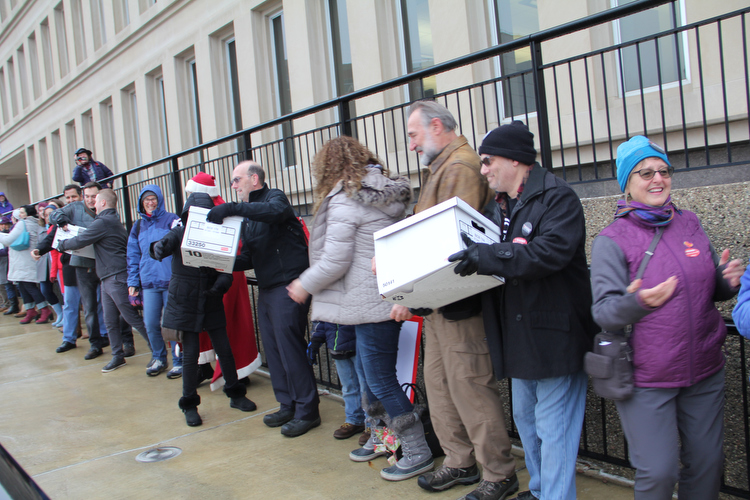
Beyond these three rules, the drawing of lines is up to states. Michigan is one of 37 states to give all power to redistricting to state legislature and uses a simple majority vote in each chamber to finalize maps.
The problem, VNP points out, begins when one party gains control of state legislature and manipulates voting districts to favor their party. This can be seen in Michigan, where Republican control of government belies real election results. According to Tom Perkins at the Metro Times, “In the 2014 and 2016 elections, Michigan Democrats in state house races received nearly the same or more total votes than Republicans, yet Republicans hold a 63-47 majority. Similar scenarios are playing out in the senate and congressional districts.”
According to VNP, the stark difference between actual vote counts and who wins elections in Michigan is result of many manipulative techniques used to draw lines, including ‘packing’ the opposition into certain districts or or ‘cracking’ dense areas of opposing voters.
Yet gerrymandering is not solely a tool of the GOP, Perkins adds. “Evidence shows that when Democrats are in power, they’ll rig the districts, and the GOP will do the same when it holds power,” he says.
In addition, gerrymandering goes beyond ensuring certain parties stay in power. According to the VNP website, gerrymandering results in no voting power, less responsiveness, as well as more polarization and gridlock. VNP argues on their website that all voters are affected, not just those in the minority:
“Gerrymandering allows politicians to split communities apart and create safe districts that are no longer competitive. By design, the voters of the minority party are doomed to not have their voices heard. But the voters in the majority party are also likely to be ignored because their representative knows that he or she can count on them to vote by party, no matter what the representative does.”
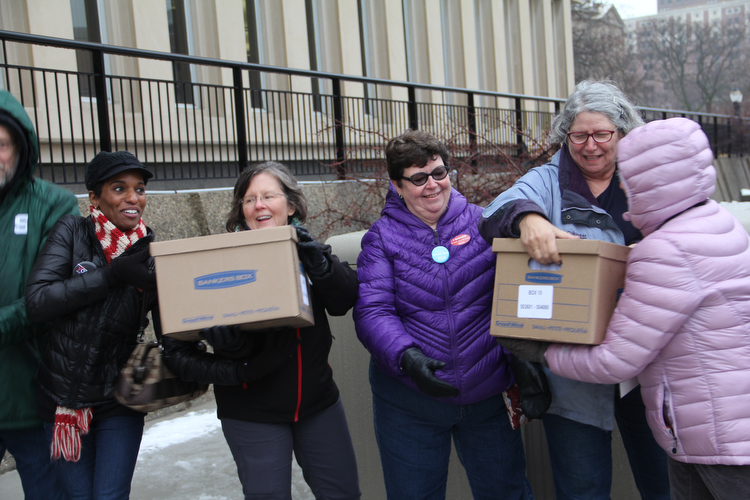
What’s more, Fahey’s hunch about Michigan voter disenfranchisement came at key time of growing awareness. A 2015 data-driven assessment of state government transparency and accountability by the State Integrity Investigation ranked Michigan dead last among all states.
The Center for Public Integrity gave the state of Michigan an ‘F’ in 10 of the 13 categories of government operations that were examined. “Thanks to loopholes created by the legislature, big spenders representing special interests can dramatically influence an election without leaving a trace,” they say.
Building a movement in small steps
As Fahey considered putting out a call to friends and family, she asked a coworker for her thoughts. “My coworker said if not now, when?” Fahey remembers.
In late 2016, Fahey, someone with no prior political experience, made a simple post on her Facebook: “I’d like to take on gerrymandering in Michigan, if you’re interested in doing this as well, please let me know.”
By the end of the day, Fahey’s post garnered enough attention that she was able to form a Facebook group focused on future actions. While forming a policy committee, they began plans to hold town halls throughout the state. “There was a lot of right people there at the start with a singular focus, which helped us work quickly,” she says.
By the end of March, VNP had held 33 town halls in 30 days. Fahey explains that the meetings focused on asking citizens of all walks of life and political persuasions: “Who should draw the election lines?” Fahey aimed to “solicit opinions across the state and invite people to the table, which is the opposite of what Michigan politicians are currently doing. It was very important to restore people’s faith in the system,” she says.
In what she calls a move of “direct democracy in which we the people craft our constitutional language,” VNP proposed amending the state constitution to establish a 13-member citizens’ commission to redraw the maps. The commision would be made up of five independent voters plus four each from the two major parties. VNP also includes a few stipulations: commissioners may not have conflicts of interest and in order to remain accountable to citizens and they must hold public hearings throughout their process.
Looking forward
Since VNP gathered over 100K more signatures than were required by the state, they have little doubt that they will get on the ballot. But Fahey knows there will be resistance ahead in the form of political advertising and op-eds. “As soon as we announced our mission, we had the establishment oppose us…which of course are those who benefit from the current system,” she says.
Some Republicans argue that VNP is a partisan effort to redistrict the state for Democratic wins. Yet as the Metrotimes reported, former Republican U.S. Rep. Joe Schwarz recently joined the VNP board because he supports a fair map and “a real battle of ideas to determine our state’s future.” Schwarz also anticipates Democratic wins in Michigan this November, and wants to avoid “undemocratic” redistricting on the part of Democrats.
Even if the amendment does pass in November, Fahey stresses that a lot of education still needs to happen as commissioners begin redrawing the map. “The work doesn’t stop,” she says. “We have to pay attention and hold commissioners accountable while also helping citizens to get involved in the process.”
Fahley reflects back on the naysayers who argued that a strong movement would need millions of dollars and couldn’t depend on volunteers. “It’s important to highlight the stories of the thousands of people who stepped up to defend our democracy, who carried a clipboard, donated a dollar,” she says.
After watching 3,500 volunteers collect signatures in all 83 counties of Michigan, Fahley is most inspired by the many people who took part in a political movement for the first time in their lives, including an 87-year old woman who carried a petition.
“People have learned that they can participate. Regular people can make change, and we’re proof of that.”
Natalie Tomlin is a freelance writer based in Grand Rapids. Her recent work appears in Midwestern Gothic, New Pages, Literary Mama, Cultured.GR, and elsewhere. A former public school teacher, she has taught writing for over a decade, most recently at DePaul University in Chicago.
Photos courtesy of Voters Not Politicians.


